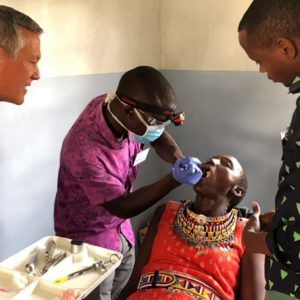DUNNELLON, FL – January 8, 2021, marked the 65th anniversary of what, at the time, appeared to be one of the worst missionary tragedies in modern history. Nate Saint, Ed McCully, Peter Flemming, Roger Youderian, and Jim Elliot sacrificed their lives attempting to share the Gospel with the Waodoni Indian tribe (formerly known as the Auca) in Ecuador.
The Lord turned the tragic deaths of those five young men in a powerful ministry into one of the greatest evangelistic triumphs of our time. Elizabeth Elliot (Jim’s widow) and Rachel Saint (Nate’s sister) continued to pursue the mission of reaching the tribe. Many of the indigenous people became followers of Christ as a result.
The Beginning

In 1994, the Waodoni invited Nate’s son, Steve, to come and live with and disciple the tribe. During his time in Ecuador, Steve learned that “his best friend in the world,” a native named Mincaye, was the man who had killed his father. What is more, Mincaye had become a Christian with a burning desire to share the comfort and joy of the Gospel of Jesus Christ with others.
Steve spent much of his time trying to figure out what he and other believers could do for the Waodoni. When he asked the Christian leaders of the tribe, they replied that they did not want missionaries to “do things” for them. They preferred that the missionaries “teach them” how to do things only the missionaries knew how to do.
The natives wanted to learn skills that would sustain them during the times no missionaries were in the field. They wanted to learn how to do the things the missionaries had been doing so that they could leverage those skills to reach other tribes in the area.
That led to Steve establishing ITEC (Indigenous People’s Technology and Education Center) in 1996. Steve is on the board of directors. His son, Jaime, is ITEC’s executive director.
The Big Difference
ITEC partners with like-minded organizations to groom short-term mission teams to equip native followers of Christ with skills not necessarily taught by missionaries. Short-term mission teams traveling under the auspices of ITEC require several months of strategizing and preparing to maximize the impact of the training of mature native believers to use that training to share the Gospel.
ITEC specializes in six realms of training, including agricultural, film, and mechanical training as well as in eyesight, medical, and dental training. While other agencies often do these things for the native people, ITEC trains those people in these disciplines.
Think about dental care, for instance. While it is nice to have an occasional visiting dental clinic, most dental problems do not schedule themselves around clinic dates. When a tooth aches, it aches NOW! With ITEC’s program,
“Indigenous Christ-following students learn basic dental skills (like extractions) from our team of professional dentists and dental assistants. They must learn and demonstrate a minimum level of proficiency in dentistry to obtain their certification. They are then encouraged to use the skills to share the love of Jesus by helping locals with basic dental problems.”
Along with dental training, ITEC provides trainees with a portable dental chair, instruments, and sanitizing equipment. The patented ITEC dental chair weighs only 25 pounds and can fit into most 30” suitcases. The chair can be positioned for the most comfortable position for the patient and the dentist.
It takes about three weeks to ensure that the newly-trained “dental technicians” are adequately proficient in operating independently.
When ITEC and its partner ministries leave the field, they leave the people behind with new and critical skill sets.
Visit the ITEC website to learn more about the other areas in which they train mature, indigenous Christ-followers with new ways to introduce the Gospel to unbelievers. You will be amazed.
Read more news on Faith Based Organizations and World Missions.
Sources:
- ITEC (Indigenous People’s Technology and Education Center Inc.), Official Website
- ITEC, ECFA




